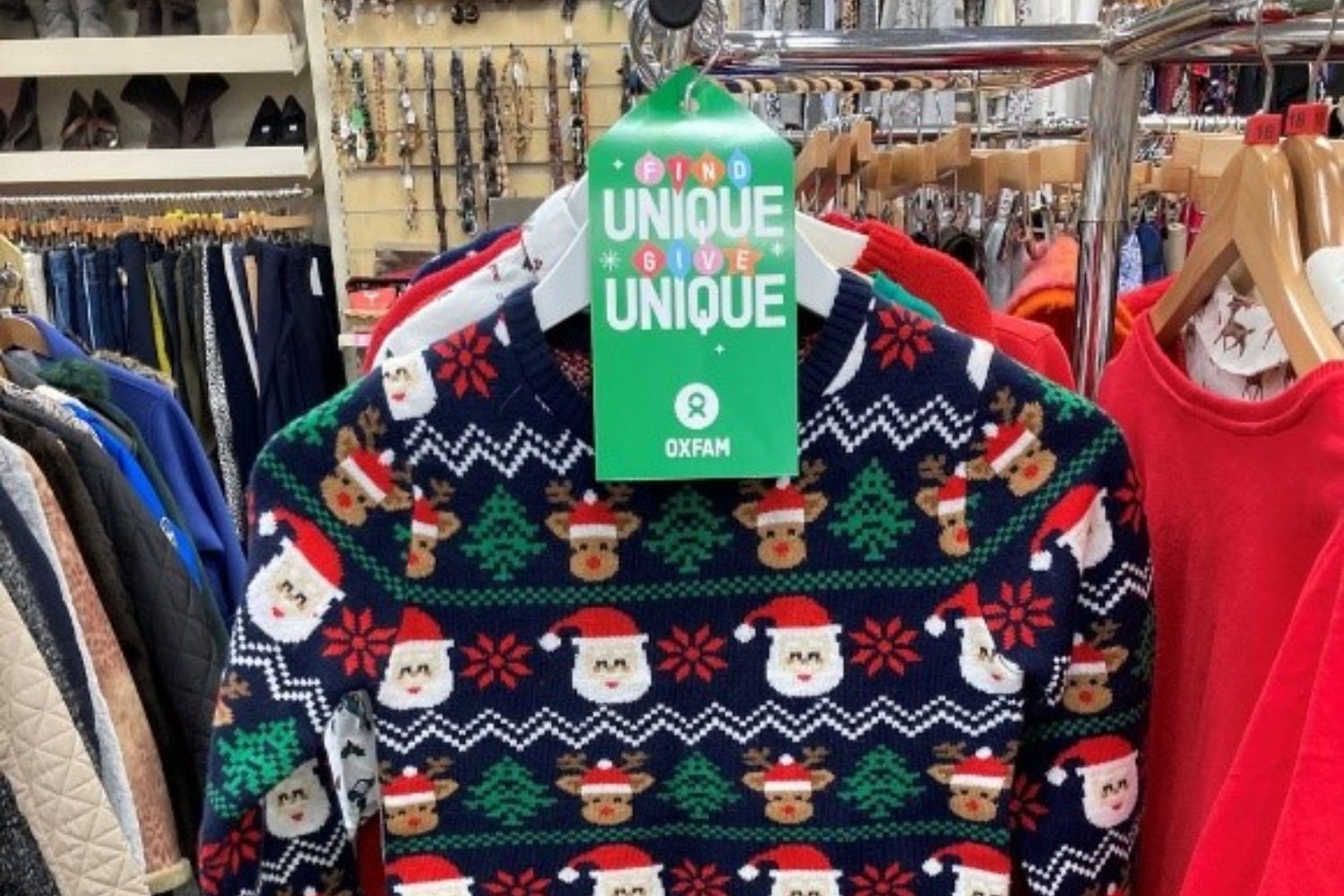Shoppers urged to buy second-hand festive clothes and gifts amid waste concerns
Oxfam and Gumtree are urging shoppers to opt for pre-loved clothing and gifts as research suggests sustainability principles slip at Christmas.

British shoppers are being urged to buy second-hand festive clothing amid concerns around waste and carbon emissions.
Research from Oxfam released on Tuesday suggests that a quarter (26%) of consumers plan to buy novelty clothing for Christmas this year that they will barely wear.
The OnePoll study, which surveyed 3,000 shoppers who celebrate Christmas, found that 72% of those planning to buy festive fashion expect to wear their purchases less than five times while 15% said they will only wear them once.
This means more than 12.7 million items could be cast aside after just a few wears, Oxfam warned.
Data from the survey also shows that people spend an average £17.20 on novelty attire, with 18-24 year-olds most likely to be the ones purchasing.
Shopping and donating second hand is one step we can all take towards building a better, safer, fairer world, not just at Christmas but year-round
The charity calculated that if all UK adults planning to buy festive fashion items this Christmas bought them second hand, it could prevent 66 million kilogrammes of carbon dioxide emissions from entering the atmosphere – equivalent to a plane flying from London to the North Pole 822 times.
Lorna Fallon, retail director at Oxfam, which has 550 charity shops nationwide, said: “Throwaway festive fashion is devastating for the planet as the fashion industry is one of the worst offenders for greenhouse gas emissions.
“By recirculating festive fashion items – buying, wearing and donating second hand – we can help to reduce the demand for new. And this could in turn help to reduce the damage to our planet.
“Our research shows that many Christmas-themed clothes will be forgotten about after just five wears so we really hope that people will consider buying their Christmas jumpers and festive fancy dress second hand this year and then donate them to Oxfam when the New Year novelty wears off.
“Shopping and donating second hand is one step we can all take towards building a better, safer, fairer world, not just at Christmas but year-round.”
Strictly professional dancer Katya Jones, who is backing Oxfam’s campaign, said: “There’s no need to splash out on a brand-new Christmas jumper, or festive pyjamas when you can extend the life of some pre-loved gems. It’s a great way to save money and is better for the environment.”
Other statistics from Oxfam found that 24% of seasonal shoppers will buy a secret Santa present this year, with more than 51% saying they would be happy to buy the gift in a charity shop.
Ms Fallon said Oxfam is encouraging shoppers to buy pre-loved presents, which make “the Christmas budget go that little bit further and has the added good cheer of helping to support people and communities around the world, including those hit hard by the climate crisis”.
Meanwhile, similar research from Gumtree suggests that 41% of the British public have “eco-guilt” over the amount of waste generated during the Christmas period but a third (33%) let sustainability principles slip during the festive season.
The survey of more than 2,000 British adults conducted by CensusWide on behalf of the online platform also found that 68% said financial strain is a central reason for buying cheaper, less sustainably considered gifts this year.
There are millions of fantastic pre-loved items out there
On average, British shoppers will spend £391 on 21 gifts this Christmas, equating to £19 billion spent on 1.4 billion gifts nationwide, according to other CensusWide research.
Yet by spring, it is predicted nearly a fifth of these presents (18%) will no longer be used – totalling £3.5bn worth of discarded gifts, it suggests.
Gumtree said its own data backs this up, with listings in April hitting the highest point in the last 12 months.
The Gumtree research also suggests that Gen Zs are the most likely to purchase Christmas novelty items, which will be bound for landfill when the new year comes in, at 50%.
Hannah Rouch, chief marketing office of Gumtree, said: “Despite many of us wanting to do our bit for the environment, it’s clear when push comes to shove, we turn to cheap, mass-produced items, resulting in tinsel-topped mountains of waste – that will ultimately be abandoned by spring.
“This Christmas, we’re urging shoppers to think ‘why’ before they buy, as well as about where they’re buying from.
“There are millions of fantastic pre-loved items out there and by making full use of the circular economy, as a destination to both list and find gifts, you can easily help cut the cost of Christmas as well as find something special for loved ones.
“More than half of us (53%) enter the season with sustainable intentions but let these slip, however, with so many unique, quality items already in existence there’s no reason why these eco-intentions can’t be achieved and purchases made which don’t cost the earth.”